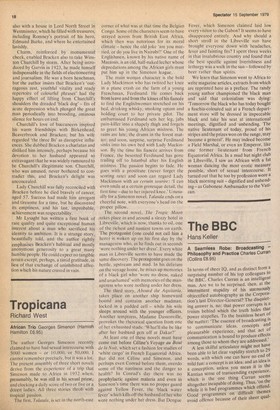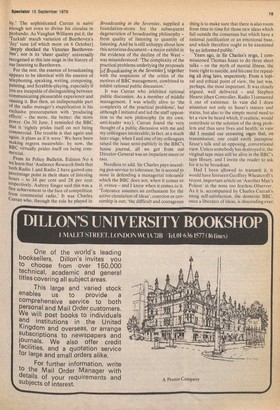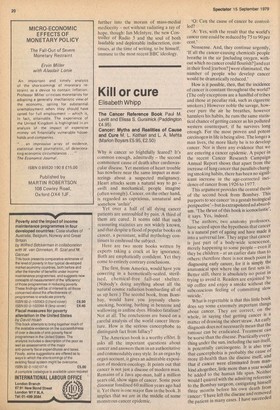The BBC
Hans Keller
A Seamless Robe: Broadcasting — Philosophy and Practice Charles Curran (Collins £8.95)
In terms of sheer IQ, and as distinct from a surprising number of his top colleagues in the BBC. Charles Curran is an intelligent man. Are we to be surprised, then, at the intermittent stupidity of his strenuously objectified autobiography as the Corpora" lion's last Director-General? The disquieting answer is, no: that power corrupts is a truism behind which the truth hides that power stupefies. To the brainless heart of the matter: *The essence of broadcasting is to communicate ideas, concepts and pleasurable experience, and that act of communication is bound to produce effects among those to whom they are addressed.' A less skilful articulator might not have been able to let clear vapidity stretch to 29 words, with which one can have no end of mild fun: a concept is an idea, and an idea is a conception. unless you mean it in the Kantian sense of transcending experience, which is the one thing Curran seems altogether incapable of doing. Thus. 'on the whole it is bad programmes which offend. Good programmes on difficult themes avoid offence because of their sheer qual ity.' The sophisticated Curran is naive enough not even to divine his circulus in probando. As Vaughan Williams put it, the 'Turkish' march variation of Beethoven's `Joy' tune (of which more on 6 October) 'deeply shocked the Victorian Beethovenites'; nor is its 'sheer quality' universally recognised at this late stage in the history of our listening to Beethoven.
For the rest. the essence of broadcasting appears to be identical with the essence of telephoning, speaking. writing. composing. Painting, and Scrabble-playing, especially if You are incapable of distinguishing between communicating pleasurable experience and causing it. But then, an indispensable part of the radio manager's stupefication is his exclusive preoccupation with 'producing effects' — the more, the better: the more Power. On 30 June, I reminded the BBC that it 'rightly prides itself on not being commercial. The trouble is that again and again, it plans as if it were.' We have been making regress meanwhile: by now. the BBC virtually prides itself on being commercial.
From its Policy Bulletin, Edition No 4 We learn that 'Audience Research finds that both Radio 1 and Radio 2 have gained one Percentage point in their share of listening hours — to 34 per cent and 28 per cent respectively. Aubrey Singer said this was a fine achievement in the face of competition from commercial radio.' It was Charles Curran who, through the role he played in Broadcasting in the Seventies, supplied a foundation-stone for the subsequent degeneration of broadcasting philosophy — from quality of listening to quantity of listening. And he is still unhappy about how this notorious document a major exhibit in the evidence of the decline of the West — was misunderstood: 'The complexity of the practical problems underlying the proposals ref' aroadcasting in the Seventies], together with the suspicions of the critics of the motives of BBC management, combined to inhibit rational public discussion.'
It was Curran who inhibited rational public discussion. As a member of middle management, I was wholly alive to 'the complexity of the practical problems', but although I initiated and led the staff opposition to the new philosophy (in my own, anti-leader way). Curran found the very thought of a public discussion with me and my colleagues intolerable; in fact, at a much later stage, when I and one of my colleagues raised the issue semi-publicly in the BBC's house journal, all we got from our Director-General was an impatient sneer or two.
Needless to add. Sir Charles pays unending pen-service to tolerance; he is second to none in defending a managerial toleranZe which the BBC does not, when it comes to it, evince — and I know when it comes to it. 'Tolerance assumes an enthusiasm for the active circulation of ideas'; coercion or censorship is out; 'the difficult and courageous thing is to make sure that there is also room from time to time for those new ideas which fall outside the consensus but which have a rational justification or an emotional base. and which therefore ought to be examined by an informed public.'
Years ago, in Sir Charles's reign, I commissioned Thomas Szasz to do three short talks — on the myth of mental illness, the basic right to suicide, and his case for repealing all drug laws, respectively. From a topical and ethical point of view, the last was, perhaps. the most important. It was closely argued, well delivered — and Stephen Hearst (then Controller, Radio 3) censored it out of existence. In vain did I draw attention not only to Szasz's stature and status. but also to the simple moral need to let a view be heard which, if realistic, would contribute to the solution of the drug problem and thus save lives and health; in vain did I remind our censoring sves that, on transmission, one could eas4 juxtapose Szasz's talk and an opposing, conventional view. Unless somebody has destroyed it, the virginal tape must still be alive in the BBC's tape library, and I invite the reader to ask for it to be broadcast.
Had I been allowed to transmit it, it would have foreseen Geoffrey Wheatcroft's recent, important article on 'Another Man's Poison' in the none too fearless Observer. As it is, accompanied by Charles Curran's smug self-satisfaction, the domestic BBC. once a liberator of ideas, is descending ever further into the morass of mass-medial mediocrity — not without radiating a ray of hope, though: Ian McIntyre, the new Controller of Radio 3 and the soul of both laudable and deplorable indiscretion, continues, at the time of writing, to be himself, immune to the most recent BBC ideology.




































 Previous page
Previous page